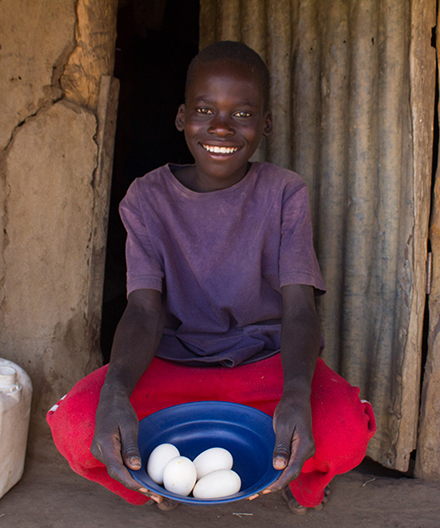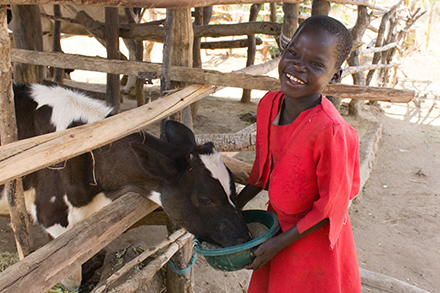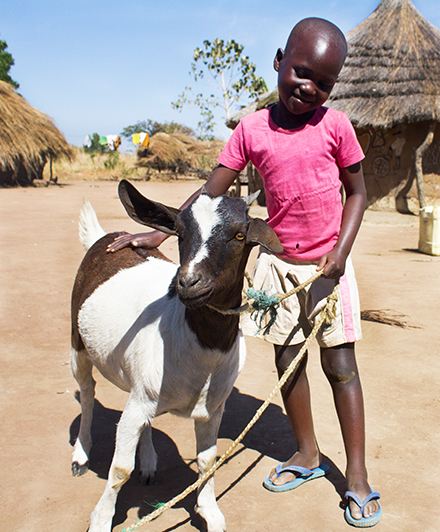Wars have obvious destructive consequences: People are killed; infrastructure is destroyed; crops are ruined. And often, an influx of disease lies in the wake.
The HIV/AIDS epidemic in Africa has been able to spread by piggybacking on many conflicts that destroy or consume much needed resources and push impoverished families over the edge.
Tino Josephine Opolot, 37, and her husband Michael, 48, live in a remote Ugandanvillage called Aminito in Kapelebyong sub-county, Amuria District, Eastern Province. The Lord’s Resistance Army, a brutal group of rebels led by Joseph Kony, was active in this area in 2003, which led to an increase in the number of people living with HIV.

Josephine and Michael struggled for years to provide for their large family. They care for their eight children, two grandchildren and their son’s girlfriend.
Josephine doesn’t like to talk about those days because of the violence and hardship that strained their marriage. She was always at home fulfilling both the role of housewife and subsistence farmer. Michael earned about $1,000 annually working as a tax collector at the nearby market and helping at a local health unit. Still, there were times when Michael, after being out all day, would come home with no money. Josephine was suspicious and questioned whether he really couldn’t find work or if he had given it to another woman.
Josephine and Michael found out they were HIV positive in 2007 and began taking anti retroviral medication (ARVs) in 2008. Fortunately, all of the children tested negative.
The doctors told them to eat more green vegetables because they are full of vitamins and boost the body’s immunity, but Josephine questioned how they could manage to eat better without having more money.
At that time, Heifer International was looking at areas in Uganda that needed assistance. When staff members conducted an assessment survey of families in Amuria District. They were shocked by the number of people who were HIV positive. They found that many were not getting tested because the stigma was so overpowering. Others thought it was witchcraft or black magic and turned to traditional healing methods.
When Josephine learned about Heifer, she was quick to join. She received peanut seeds, green gram and tomato, cabbage and onion seeds. Farmers in this region needed a way to clear and plant more land, so Heifer provided them with four oxen and a plow to be shared by six families.

Preparing two acres for cultivation by hand would take their whole family working together for about three weeks. With the oxen, they can plow the same area in two. Josephine is currently utilizing half of the five acres they own.
Josephine loves the Heifer trainings. Through them, she has learned how to construct a Lorena stove and a drying rack. She has learned about the benefits of solar drying, and she has participated in trainings on kitchen gardening, human hygiene–which taught her about rubbish pits, tiptaps and latrines–and Heifer’s 12 Cornerstones for Just and Sustainable Development.
“I immediately put the trainings into practice so that I would never forget,” she said.
When each person in her group chose their favorite Cornerstone, she chose Sustainability and Self-Reliance.
“I was very confident that I could be sustainable and wanted to help others become sustainable,” Josephine said. “After the project, I want people to be able to come here and see our home as a model.”
The stove construction training has saved Josephine a lot of time and energy. She was collecting a bundle of firewood every two days, but thanks to her more efficient stove, she only has to collect once a week, which allows her to stay close to home.
Josephine teaches her children what she learns during the trainings. “We’ve been working shoulder to shoulder,” she said. “Even if I died tomorrow, they would be able to carry on.” After Heifer sponsored a gender sensitization and domestic violence training, she and Michael started discussing their plans and working together.
When she began using manure in their gardens last year, she quickly realized its value for fertilizing her crops. Josephine borrows manure from neighbors when she doesn’t have enough. Her crops aren’t stunted. They are taller and greener.
“Even the maize is better,” said Josephine. “Before we didn’t grow maize because we would never get a harvest. Now, because the soil fertility has improved, we can plant maize.”

She is a really good businesswoman. Josephine sells tomatoes, cabbage, onions, dried silverfish and dried bananas, and is earning around $1,044 per year. She is proud to contribute directly to the financial stability of her family.
This new income was recently very important. They used it to pay their dependents’ medical bills. Anyipo Doreen, 19, was very sick with malaria and a urinary tract infection during her pregnancy. Doreen is doing well and the entire family is experiencing better health because they are eating better. “Because of the better diet, when someone gets sick, we get well faster,” said Josephine. Josephine’s T-cell count is up to 470, which is still low, but she said she feels stronger. Her mental health has also improved. She isn’t constantly worried.
Josephine buys bananas for the solar dryer and oil to make baggia, a deep-fried snack. She has also purchased a goat and a mobile phone, and she is better equipped to pay for her children’s school fees.
Today, Josephine has 20 animals: three goats, one sheep, two cattle, 10 chickens and the four oxen that she shares with the other families. She saved some of the money she earned from selling vegetables and fish to buy two goats, which she named “Heifer” and “Grace.” Grace has given birth to one kid. Josephine also has a sheep named “Peace.”
Josephine isn’t the only woman whose life has improved. The women in Josephine’s group have all benefited. They are reaching out to women who are outside the project, telling them how they have been transformed and inviting others to come learn.
“After the capacity building training, we have learned so much and this knowledge has transformed us,” Josephine said. “I am always open and willing to teach others.” One of the things they ask her is how she keeps insects from eating all the vegetables. “Now I have this skill to make organic pesticides, so I like to pass it on to other people,” she said.
Josephine believes in Passing on the Gift® (POG). “It maintains a chain,” she explained. “It is a mode of sharing, and sharing encourages unity. In times of sickness, a neighbor can rescue you.”
Her group knows the value of sharing, too. Unity and cooperation between neighbors in this remote corner of the world is vital. They help people who aren’t part of their group by plowing land for free.
“I have seen the large impact from this project,” said Josephine. She thinks that Heifer is a special organization, an organization that cares. “Other organizations have come but they don’t do any follow-up on the activities,” she said. “Heifer really trained us and followed up to make sure we have really put it into practice.”
Story by Christian DeVries
Photos by Katya Cengel